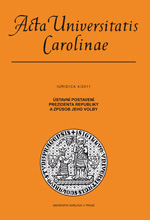Volba prezidenta Polské republiky a jeho ústavní pozice
Volba prezidenta Polské republiky a jeho ústavní pozice
Author(s): Iwona WróblewskaSubject(s): Law, Constitution, Jurisprudence
Published by: Univerzita Karlova v Praze, Nakladatelství Karolinum
Keywords: president; Polish republic; direct elections; powers; government
Summary/Abstract: The structure of relations between the supreme powers in Poland is being characterized by polish doctrine of law as a kind or rationalization of parliamentary-cabinet system. The restitution of the monocratic head of state took place after the “round table” agreements in 1989. One year later the principle of the general elections of the president was introduced. This solution was upheld by the polish Constitution of 2 April 1997, even though the competences of the President do not enable him to pursue an independent policy. The legal basis of the presidential elections is included in the Constitution and the Election Code of January the fifth 2011. The elections are general, equal, direct and secret. A two rounds majoritarian electoral system has been introduced. If in the first round none of candidates gains absolute majority, the second round is being organised, in which compete two candidates with the highest number of votes and the rule of relative majority is in force. The candidate for President must, among other requirements, be 35 years old, have polish citizenship and full voting rights to the Sejm (lower house of the Parliament). The candidate is put up by at least a 100 000 citizens with complete voting right to the Sejm. The right to put up a candidate and to campaign for him is vested in the electoral committee. The electoral committee can be constituted only by electors. There is a judicial system of verification of the elections (by the Supreme Court). The President of the Republic of Poland is elected for five years. The same person cannot hold the office longer than for two cadencies, which don’t have to come directly one after another. The executive power in Poland is entrust to dualistic executive: President and government. The presumption of competence in the sphere of executive power is vested in the government. In this area the exercise of tasks and competencies of the President involves the necessity of co-ordination with the government and countersignature of the Prime Minister. Following the German example, the Constitution of 1997 has eliminated the 100 strong bounds between both segments of executive power, strengthened the position of the Prime Minister and impaired the competences of the President. In spite of the impairment of the President’s position in the current constitutional regulations, the range of his powers is still very wide. They concern in particular his relationship with the Parliament, issues connected with appointment of ministers and the responsibility of the government, appointment of certain state authorities and also traditional powers of the head of state. He acts independently in the sphere of presidential arbitration, having the right to shorten the term of office of the Parliament in situations indicated in the Constitution and to veto a bill enacted by the Parliament. He can also direct bills to the Constitutional Court. (...)
Journal: Acta Universitatis Carolinae Iuridica
- Issue Year: 57/2011
- Issue No: 4
- Page Range: 89-100
- Page Count: 12
- Language: Czech

